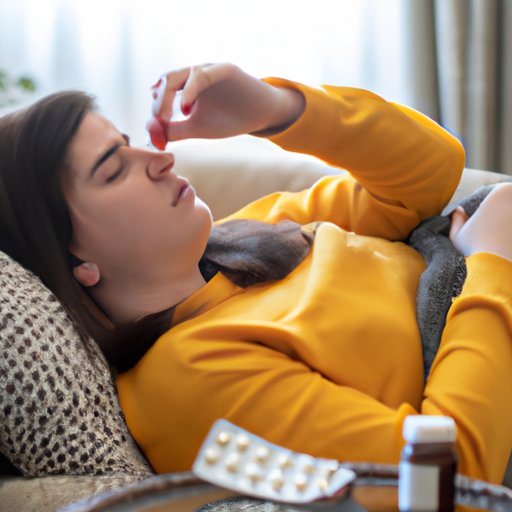
Do Antihistamines Make You Drowsy?
If you have ever taken an antihistamine to relieve allergy symptoms like sneezing, itching, and congestion, you may have noticed that it also helps you feel drowsy. In fact, some antihistamines are even marketed as sleep aids due to their sedative effects. But how do antihistamines affect your sleep, and what are the risks and benefits of using them for this purpose?
The Relaxation Effect: How Antihistamines Can Help You Sleep Better
First, let’s explore how antihistamines work. These medications block the action of histamine, a chemical that causes inflammation and other allergy symptoms. By reducing the histamine response, antihistamines can alleviate these symptoms and make you feel more relaxed. In turn, this relaxation can promote better sleep.
Some antihistamines like diphenhydramine or doxylamine have stronger sedative effects than others. These medications are often used as sleep aids due to their ability to induce drowsiness and help people fall asleep more quickly.
The Drowsy Truth: The Relationship Between Antihistamines and Sleepiness
While antihistamines can promote relaxation and sleepiness, they can also have negative side effects. Drowsiness is one of the most common side effects of antihistamines, but it can range from mild fatigue to severe impairment, depending on the individual and medication type.
The histamine receptor, which antihistamines target, plays a role in regulating wakefulness and sleep. By blocking this receptor, antihistamines can cause drowsiness. However, the extent of this effect depends on the medication and other individual factors like age, dosage, and other medications. For example, older adults may be more susceptible to drowsiness due to slower metabolism of the medication.
The Antihistamine Hangover: How to Cope with Daytime Drowsiness
Daytime drowsiness can be a major problem for those taking antihistamines. It can impair productivity, increase the risk of accidents, and generally make daily activities more challenging. But there are ways to cope with drowsiness and reduce its impact on your daily life.
First, staying hydrated is essential to combat drowsiness. Dehydration can actually make you feel more tired, so it’s important to drink enough water throughout the day. Avoiding alcohol and caffeine is also important since both can interfere with your sleep schedule and exacerbate drowsiness. Taking breaks throughout the day, moving around, and exposing yourself to natural light can also help mitigate drowsiness.
If antihistamine-induced drowsiness persists, you may consider changing your medication or adjusting the dosage or timing. Your healthcare provider can help you determine the best strategy for your specific needs.

The Science Behind Antihistamines and Drowsiness: What You Need to Know
The relationship between antihistamines and drowsiness has been extensively studied, and there is a lot of research to explain the biological mechanisms behind this effect.
Antihistamines have an impact on the central nervous system, specifically by inhibiting the activity of histamine in certain regions of the brain. This can lead to sedation, drowsiness, and impairment of cognitive and motor skills.
Recent studies have also highlighted the importance of understanding the implications of antihistamine use on driving performance. Research shows that antihistamines can significantly impair driving ability, and some experts have suggested that people taking these medications should be advised to avoid driving or operating heavy machinery.
Wake Up Refreshed: Tips to Minimize Antihistamine Drowsiness
If you are dealing with the drowsiness caused by antihistamines, there are several strategies you can try to alleviate symptoms.
First, consider making lifestyle changes like getting regular exercise, adopting healthy sleep habits, and avoiding triggers that exacerbate allergies. You can also try non-medication alternatives like nasal sprays, eye drops, and other allergy-relief products. Natural remedies like herbal supplements and saline rinses may also be effective in managing allergy symptoms without causing drowsiness.
If medication remains necessary, talk to your healthcare provider about alternative and non-drowsy medications that may be appropriate for your specific needs. Adjusting the timing or dosage of medication may also help reduce daytime drowsiness.
To Drowse or Not to Drowse: A Comprehensive Guide to Antihistamines and Sleep
In conclusion, antihistamines can be useful for managing allergies and promoting relaxation and sleepiness. However, they can also cause drowsiness and other negative side effects that can impair daily functioning.
If you choose to use antihistamines for improved sleep, it’s important to understand the risks and benefits and to take steps to minimize drowsiness. Strategies like staying hydrated, avoiding alcohol and caffeine, and adjusting medication dosage and timing can help reduce the impact of antihistamine-induced drowsiness.
Ultimately, the decision to use antihistamines for sleep is a personal one that should be made based on individual needs and preferences. By understanding the science behind antihistamines and drowsiness and exploring alternatives, you can make an informed decision that prioritizes your health and wellbeing.





